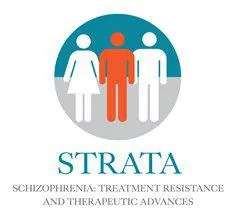Around one third of people with schizophrenia fail to respond to at least two standard antipsychotics, and thus meet NICE criteria for ‘treatment resistant schizophrenia’ (TRS). Around half of these people will eventually respond to clozapine, a drug which is uniquely effective in receiving symptoms and improving functioning in people with TRS. However, most treatment resistant patients do not receive clozapine until late in their disease, if at all. It is known that delay in clozapine treatment results in lower response rate to clozapine, so if we could know in advance who will develop TRS then they could be offered clozapine sooner and have a better outcome.
Our overarching hypothesis is that so-called ‘treatment resistant’ psychosis has a distinct neurobiology, and that biomarkers could be used to stratify people with TRS and fast-track them onto clozapine, or other future treatments that might be effective in TRS. The biomarkers identified may also help to us to understand more about how the brain is affected in TRS and how it differs from other forms of schizophrenia.
The work of the STRATA consortium was divided into four main parts:
- In our ‘Phase 1’ clinical study, we studied genetic and neurochemical differences between people with treatment resistant versus treatment responsive schizophrenia. The findings of this research have been submitted for publication and will be shown here when the research is published in a peer reviewed journal.
- In ‘Phase 2’, we conducted a longitudinal study to investigate dynamic changes in GLU in patients starting antipsychotics early in the illness course, since this is when prediction will be at its most useful and when critical treatment decisions need to be made to shorten the delay to effective treatment.
- In the ‘STRATA-G’ project, we studied the genetics of treatment response using samples collated from collaborators around Europe.
- In collaboration with H Lundbeck, we developed predictive models for TRS, using clinical and demographic data from electronic health records.
Data collection was completed in December 2019 and the results will be published over the next one to two years.

